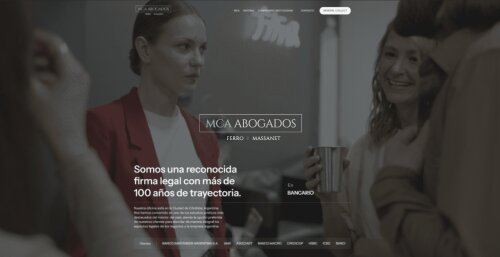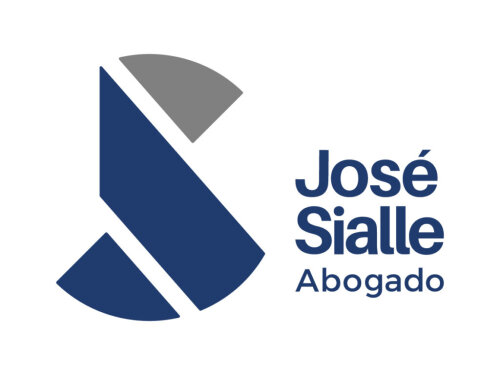Best Transportation Lawyers in Córdoba
Share your needs with us, get contacted by law firms.
Free. Takes 2 min.
List of the best lawyers in Córdoba, Argentina
About Transportation Law in Córdoba, Argentina
Transportation law in Córdoba operates within a multi-layered legal framework that includes national statutes, provincial regulations and municipal ordinances. The field covers rules for private vehicles, commercial freight, public passenger services, road safety, vehicle registration and technical inspections, insurance requirements and environmental standards. Enforcement and administration are carried out by a combination of national agencies, provincial road authorities, municipal transit departments and police forces. For anyone using roads in Córdoba - drivers, passengers, transport companies or pedestrians - transportation law affects licensing, liability after accidents, permits for commercial activity and the sanctions for traffic infractions.
Why You May Need a Lawyer
People seek legal help in transportation for many reasons. After a traffic accident you may face civil claims for damages, insurance disputes or criminal investigations if there are serious injuries or fatalities. Administrative matters like fighting fines, appealing license suspensions or contesting vehicle immobilization often require procedural knowledge. Companies and independent drivers need legal support to obtain permits, comply with safety and labor rules, manage cross-border transport and resolve contract disputes. Other scenarios include buying or selling vehicles with hidden defects, recovering stolen vehicles, advising on regulatory compliance for app-based transport services and representing drivers or companies in negotiations with insurers or public authorities.
Local Laws Overview
Key legal aspects that affect transportation in Córdoba include the following. First, national traffic legislation establishes basic obligations for drivers and vehicles and sets out criminal and civil responsibility for traffic incidents; that national framework is implemented and supplemented by provincial and municipal rules. Second, driver licensing and vehicle registration are administered at provincial and national levels, and drivers must meet medical and training requirements for specific vehicle categories. Third, mandatory third-party liability insurance is required for motor vehicles and is the usual first source of compensation after accidents. Fourth, technical inspections or periodic vehicle checks help ensure roadworthiness for certain vehicle classes. Fifth, traffic infractions can lead to fines, administrative points or records, license suspensions and vehicle immobilization; there are administrative procedures to contest these measures. Sixth, serious accidents can trigger criminal investigations for negligent injury or homicide, with different standards for criminal and civil responsibility. Seventh, commercial transport of goods and passengers requires licenses, permits and compliance with load limits, weight controls, working hours and safety rules. Eighth, local authorities regulate taxis, remises and app-based transport services through municipal ordinances that address permits, fares and operating conditions. Finally, enforcement bodies you are likely to encounter include municipal transit departments, Policía Caminera or highway police, provincial road agencies and local courts and tribunals that handle administrative and judicial appeals.
Frequently Asked Questions
What should I do immediately after a traffic accident in Córdoba?
Prioritize safety and medical aid first - call emergency services if there are injuries. If it is safe, secure the scene to prevent further harm, take photos of the vehicles, the scene and license plates, and collect contact details of witnesses. Call the police so an official report can be prepared. Do not admit fault at the scene. Report the incident to your insurer as soon as possible and, if you expect claims or criminal investigations, consider contacting a lawyer experienced in traffic accidents to protect your rights and preserve evidence.
How do I file an insurance claim after an accident?
Notify your insurer promptly and provide the required documents - police report, vehicle registration, driver licenses, photos, and medical reports if applicable. Your insurer will open a file and may send an adjuster to assess damages. Keep copies of all communication and receipts for repairs or medical treatment. If the insurer denies coverage or undervalues damages, you can request an internal review and, if unresolved, take the dispute to the Superintendence of Insurance or consult a lawyer to pursue compensation through negotiation or litigation.
Can I challenge a traffic fine in Córdoba?
Yes. Municipal and provincial traffic fines are subject to administrative appeal procedures. Typically the first step is to present a rebuttal or request a review before the issuing authority within the timeframe indicated on the citation. If the administrative appeal fails, you can often challenge the decision in the local administrative courts or tribunals. A lawyer can advise on deadlines, required documentation and procedural strategy - for example, whether to request suspension of the fine or the enforcement measure while the appeal is pending.
What are the legal consequences of driving with a suspended or expired license?
Driving with a suspended or expired license can lead to administrative fines, further suspension periods, vehicle immobilization and potential legal exposure if you cause an accident. If the suspension was ordered after an infraction or a criminal proceeding, you may face harsher penalties. It is important to resolve licensing issues promptly through the issuing authority and consult a lawyer if you face enforcement measures or if driving under suspension resulted in an accident or other damage.
How are civil and criminal responsibilities determined after a serious accident?
Civil responsibility focuses on compensation for material damages and bodily injury and is determined by fault, negligence or breach of duty of care. Criminal responsibility applies when conduct meets elements of a criminal offense - for example, negligent injury or negligent homicide - and is pursued by public prosecutors. The standards and procedures differ: civil cases use evidence to prove liability and calculate damages, while criminal cases may involve police reports, forensic evidence and different burdens of proof. Both civil and criminal claims can proceed in parallel, and coordination between criminal defense and civil defense is often necessary.
Do commercial carriers need special permits to operate in Córdoba?
Yes. Freight carriers and passenger transport operators must comply with specific licensing, registration and safety requirements. Permits can cover route authorizations, vehicle certifications, load limits, and obligations related to driver working hours and records. Transport companies must also comply with labor rules for drivers and often maintain additional insurance coverage. Regulatory requirements vary depending on whether transport is local, interprovincial or international, and a lawyer can assist in obtaining or defending permits and ensuring regulatory compliance.
How are taxis, remises and app-based ride services regulated locally?
Municipalities regulate taxi and remis services through permits, vehicle standards and fare rules. App-based platforms are typically regulated at the municipal level as well, and requirements can include specific permits for drivers, vehicle inspections, data sharing and consumer protections. If you operate or use these services, check municipal ordinances and ensure the operator holds the required authorizations. Disputes over permits, fines or contractual clauses with platforms often require legal advice focused on local rules and administrative procedures.
What documents do I need to register or transfer ownership of a vehicle in Córdoba?
Typical documentation includes the vehicle title or original ownership certificate, national identity documents of buyer and seller, vehicle identification number (VIN) and license plates, proof of payment of taxes and fees, and a valid technical inspection certificate when required. Sales contracts and power-of-attorney documents may be necessary if parties act through representatives. The precise list depends on national and provincial requirements and the Registro Nacional de la Propiedad del Automotor processes involved.
What are my rights if my vehicle is immobilized or seized by authorities?
Authorities may immobilize or impound vehicles for reasons like expired documents, unpaid fines, unsafe conditions or criminal investigations. You generally have the right to receive a formal notice stating the grounds for immobilization and the steps for recovery. Administrative procedures specify deadlines, fines and fees to release the vehicle. You may challenge the measure through administrative appeals or courts if you believe it was improper. A lawyer can help assess whether procedural safeguards were observed and represent you in appeals to recover the vehicle promptly.
Where can I find affordable or free legal help for transportation issues?
If you cannot afford a private lawyer, there are several options. Public legal aid services and provincial or municipal legal assistance programs may provide support for qualifying individuals. The Colegio de Abogados de la Provincia de Córdoba and university legal clinics sometimes offer low-cost or pro bono services. Consumer protection offices and Defensoría del Pueblo can assist with certain disputes. For criminal cases, public defenders provide representation when required by law. Contact these institutions to learn about eligibility and available services.
Additional Resources
Agencia Nacional de Seguridad Vial - National body that develops road safety policies and issues guidance on traffic rules and prevention.
Dirección Nacional de Vialidad - National roads authority that oversees infrastructure and interstate transport regulations.
Agencias y Direcciones Provinciales de Tránsito - Provincial transport and road safety authorities in Córdoba that manage licensing, inspections and provincial permits.
Municipal Directions of Transit - Local municipal offices in cities like Córdoba that handle local permits, taxis and fines.
Registro Nacional de la Propiedad del Automotor - The national vehicle registry for title transfers, registrations and related procedures.
Policía Caminera de Córdoba and local police transit units - Enforcement agencies that respond to accidents, perform controls and prepare reports.
Superintendencia de Seguros de la Nación - National regulator for insurance companies and dispute handling related to claims.
Colegio de Abogados de la Provincia de Córdoba - Local bar association that can help locate attorneys with experience in transportation and traffic law, and may offer referral or pro bono assistance.
Defensoría del Pueblo de la Provincia de Córdoba and Dirección de Defensa del Consumidor - Offices that assist with consumer disputes, including vehicle purchase issues and service complaints.
Local municipal courts and tribunals for administrative appeals - The bodies that hear challenges to fines, immobilizations and local transit decisions.
Next Steps
If you need legal assistance in a transportation matter in Córdoba, follow these practical steps. First, secure essential documents and evidence - police reports, photos, witness contacts, vehicle registration, driver licenses, insurance papers, medical records and any contracts or permits. Second, report incidents promptly to the relevant authorities and your insurer, following required timeframes. Third, decide what type of lawyer you need - traffic accident specialist, criminal defense lawyer for serious incidents, administrative lawyer for fines and appeals, or transport regulatory counsel for commercial compliance. Fourth, contact one or more attorneys for an initial consultation - prepare questions about experience with Córdoba authorities and courts, likely outcomes, timelines and fee arrangements. Fifth, consider interim protective actions - preserve evidence, request copies of official reports, and, if urgent, seek provisional measures or interlocutory relief through counsel. Sixth, if cost is a concern, check eligibility for public defenders, legal aid clinics or pro bono services through the Colegio de Abogados. Finally, act quickly - many administrative and judicial remedies have short deadlines, and prompt legal advice improves your chances of a favorable outcome.
Lawzana helps you find the best lawyers and law firms in Córdoba through a curated and pre-screened list of qualified legal professionals. Our platform offers rankings and detailed profiles of attorneys and law firms, allowing you to compare based on practice areas, including Transportation, experience, and client feedback.
Each profile includes a description of the firm's areas of practice, client reviews, team members and partners, year of establishment, spoken languages, office locations, contact information, social media presence, and any published articles or resources. Most firms on our platform speak English and are experienced in both local and international legal matters.
Get a quote from top-rated law firms in Córdoba, Argentina — quickly, securely, and without unnecessary hassle.
Disclaimer:
The information provided on this page is for general informational purposes only and does not constitute legal advice. While we strive to ensure the accuracy and relevance of the content, legal information may change over time, and interpretations of the law can vary. You should always consult with a qualified legal professional for advice specific to your situation.
We disclaim all liability for actions taken or not taken based on the content of this page. If you believe any information is incorrect or outdated, please contact us, and we will review and update it where appropriate.













